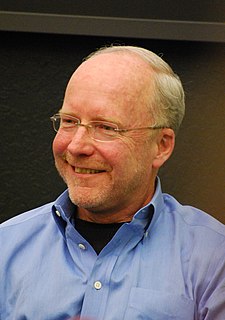A Quote by Thomas Sowell
Ideas, as the raw material from which knowledge is produced, exist in superabundance, but that makes the production of knowledge more difficult rather than easier. Many ideas- probably most- will have to be discarded somewhere in the process of producing authenticated knowledge. Authentication is as important as the raw information itself, and the manner and speed of the authentication process can be crucial.
Related Quotes
The difference between you, if you consider yourself not enlightened, and an enlightened master is not that the enlightened master has more knowledge. University professors have knowledge, and many enlightened masters have very little knowledge. Jesus probably had less knowledge than any university professor alive today in terms of raw information. Even a relatively uneducated person has more information than Jesus or Buddha ever had about things, such as political things and so on.
I am convinced that it is impossible to expound the methods of induction in a sound manner, without resting them upon the theory of probability. Perfect knowledge alone can give certainty, and in nature perfect knowledge would be infinite knowledge, which is clearly beyond our capacities. We have, therefore, to content ourselves with partial knowledge - knowledge mingled with ignorance, producing doubt.
Data isn't information. ... Information, unlike data, is useful. While there's a gulf between data and information, there's a wide ocean between information and knowledge. What turns the gears in our brains isn't information, but ideas, inventions, and inspiration. Knowledge-not information-implies understanding. And beyond knowledge lies what we should be seeking: wisdom.
The knowledge we now consider knowledge proves itself in action. What we now mean by knowledge is information effective in action, information focused on results. Results are outside the person, in society and economy, or in the advancement of knowledge itself. To accomplish anything this knowledge has to be highly specialized.
And if there be any addition to knowledge, it is rather a new knowledge than a greater knowledge; rather a singularity in a desire of proposing something that was not knownat all beforethananimproving, anadvancing, a multiplying of former inceptions; and by that means, no knowledge comes to be perfect.
It's very important to distinguish between what most people in the West think about knowledge, and what the Indian concept of knowledge is. In the West the knowledge is something that is tangible, is material, it is something that can be transferred easily, can be bought and sold; or as in India real knowledge is something that is a living being - is a Vidya.
It is impossible to talk of respect for students for the dignity that is in the process of coming to be, for the identities that are in the process of construction, without taking into consideration the conditions in which they are living and the importance of the knowledge derived from life experience, which they bring with them to school. I can in no way underestimate such knowledge. Or what is worse, ridicule it.
The ideas of the ruling class are in every epoch the ruling ideas, i.e. the class which is the ruling material force of society, is at the same time its ruling intellectual force. The class which has the means of material production at its disposal, has control at the same time over the means of mental production, so that thereby, generally speaking, the ideas of those who lack the means of mental production are subject to it. The ruling ideas are nothing more than the ideal expression of the dominant material relationships, the dominant material relationships grasped as ideas.
The knowledge of the individual citizen is of less value than the knowledge of science. The former is the opinion of individuals. It is merely subjective and is excluded from policies. The latter is objective - defined by science and promulgated by expert spokesmen. This objective knowledge is viewed as a commodity which can be refined... and fed into a process, now called decision-making. This new mythology of governance by the manipulation of knowledge-stock inevitably erodes reliance on government by people.
It [knowledge] is clearly related to information, which we can now measure; and an economist especially is tempted to regard knowledge as a kind of capital structure, corresponding to information as an income flow. Knowledge, that is to say, is some kind of improbable structure or stock made up essentially of patterns - that is, improbable arrangements, and the more improbable the arrangements, we might suppose, the more knowledge there is.





































